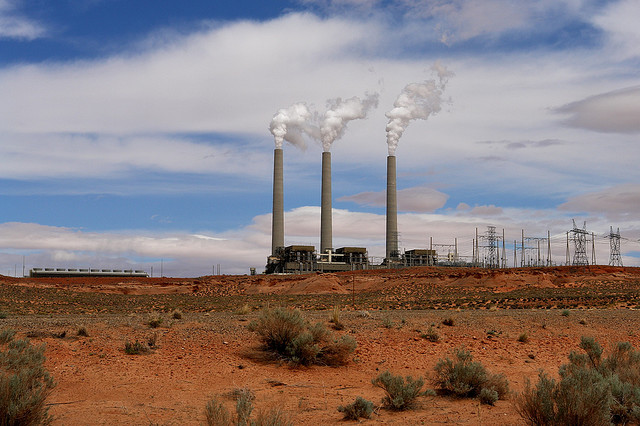
Bit by bit, the US Environmental Protection Agency is moving to limit the gases that scientists say cause global warming. Over five years, the agency is limiting auto emissions and is also requiring new industrial plants to use improved pollution controls
Sooooo, US Justice Department lawyers argue, California, seven other states, New York City and three land trusts should not be suing major utilities, demanding that they reduce global warming emissions.
In papers filed with the US Supreme court this week, Justice Department lawyers argue the authority to curb emissions that cause climate change belongs to the Environmental Protection Agency and to Congress.
Congress isn’t doing anything at present about global warming, but the Obama administration argues the case should be dismissed. As do the power companies.
The suit, AEP v. Connecticut, was filed in 2004, against American Electric Power, Duke Energy, Southern Company and Xcel Energy, (none based in California, though Xcel has customers in Colorado and New Mexico), claiming that climate change has damaged state resources. The plaintiffs want court orders requiring power companies to reduce carbon dioxide emissions by three percent a year for 10 years. A federal judge in New York dismissed the suit but the 2nd U.S. Circuit Court of Appeals ruled last September that the states could try to prove their case.
At the time, federal lawyers say, the judges felt the “EPA does not currently regulate carbon dioxide.” Since then, the lawyers argue, the Obama administration has finalized several regulations in response to the Supreme Court’s 2007 decision in Massachusetts v. EPA, which told the agency to decide whether greenhouse gases were pollutants under the Clean Air Act.
In the brief, Acting Solicitor General Neil Katyal writes: “That regulatory approach is preferable to what would result if multiple district courts — acting without the benefit of even the most basic statutory guidance — could use common-law nuisance claims to sit as arbiters of scientific and technology-related disputes and de facto regulators of power plants and other sources of pollution both within their districts and nationwide.”
“It’s hard for me to tell whether this is craven or stupid,” wrote UCLA Law Professor Jonathan Zasloff on the enviro law and policy blog LegalPlanet. “This represents the administration going above and beyond the call of duty to undermine the chances of a sensible energy policy. Yes, a comprehensive statute would be better,” wrote Zasloff. “And you know what? It ain’t going to happen.”
California’s biggest tie to coal-fired power may be cut without the courts. The (relatively) new head of the Los Angeles Department of Water & Power says he wants to divest its stake in the Navajo Generating Station in Arizona, ahead of schedule – which is to say, sometime before 2019.
